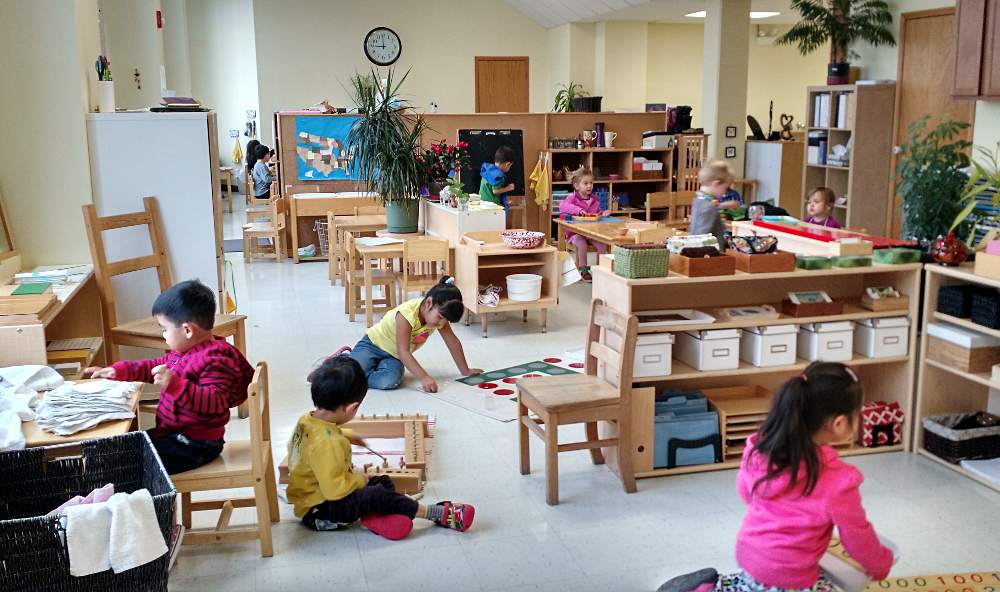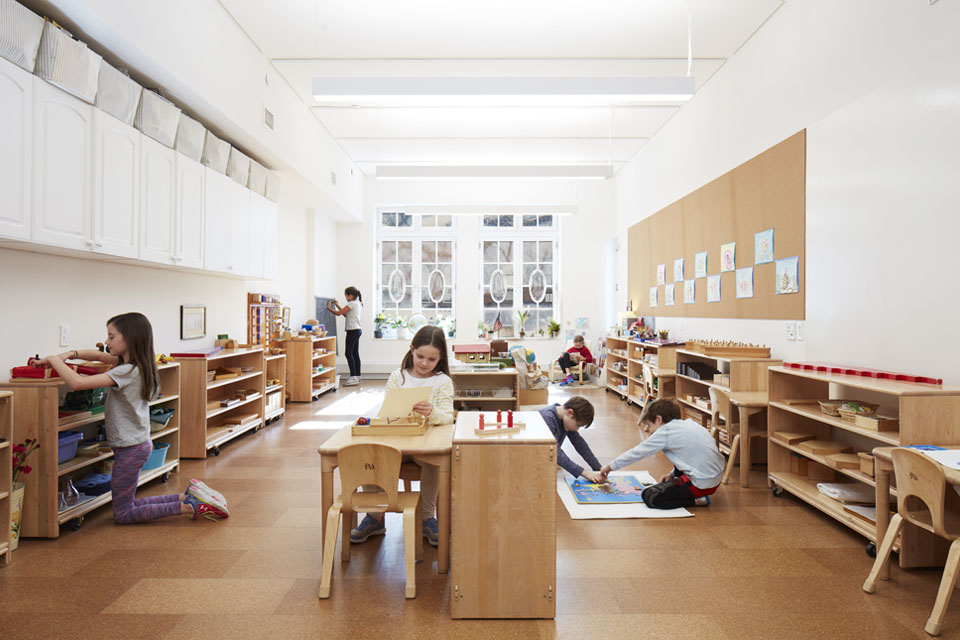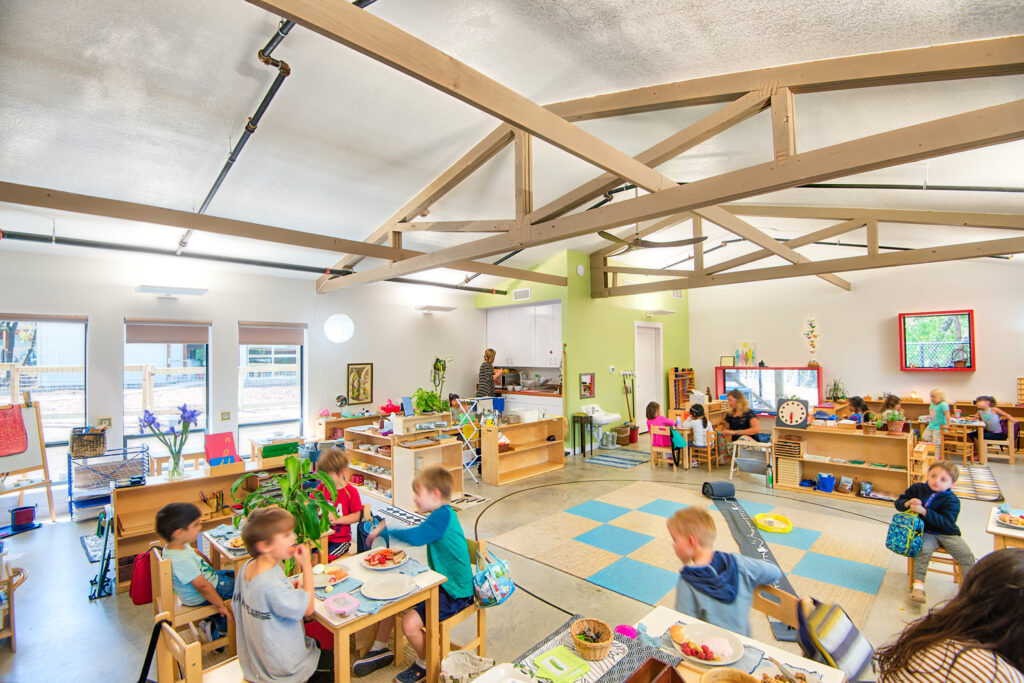Finding the best childcare for your little one can be a difficult task to navigate. From deciding what type of childcare service is best suited for your child to exploring the different educational approaches, there’s plenty to learn along the way. Whichever childcare option you eventually settle on, you want to make sure that your child is supported and gets the best possible education wherever they go.
So to help you on your childcare journey, we’re here to explore the differences between the Montessori approach and classic childcare.
What is Montessori childcare?
Montessori childcare is an educational approach to early childhood education and care that’s been around since the early 1900s. This approach is based on the principles of Dr. Maria Montessori, an Italian physician and educator.
Montessori childcare focuses on creating a child-centred learning environment that promotes independence, exploration and hands-on learning. The Montessori method is designed to allow children to learn at their own pace while encouraging their natural curiosity and desire to learn.
In a Montessori childcare setting, the classroom is typically designed to be child-sized and child-friendly, with activities and materials that are carefully chosen to meet the developmental needs and interests of each child. Children are encouraged to work independently or in small groups, with the educator acting as a guide or facilitator rather than a traditional early childhood educator.
The Montessori approach to childcare is based on the belief that children learn best through their own experience and that education should be tailored to meet each child’s unique needs and abilities. The goal of the Montessori approach is to help children develop a love of learning, independence, self-discipline and respect for themselves and those around them.
Montessori childcare centres are becoming increasingly popular around the world and here in Australia, with Montessori schools and childcare centres offering programs designed for children from infancy through to primary school age.

What is classic childcare?
Classic childcare refers to more traditional models of childcare, which usually involve a structured environment where children follow a set schedule of activities, such as circle time, art time and story time. This type of childcare often takes a play-based approach to early childhood education and care.
Classic childcare is often delivered in purpose-built childcare centres with children being grouped into age-based classes with their own designated space. Early childhood educators usually lead play-based activities and provide instruction with a focus on developing children’s problem-solving, cooperation, conflict resolution and social skills.
The main differences between Montessori and classic childcare
Both Montessori and classic childcare providers provide high-quality care and education to young children. They provide children with an opportunity to socialise with their peers, develop friendships and build trusting relationships with adults other than their parents and close relatives.
These two childcare approaches are intended to foster a love of learning and provide them with the foundational knowledge and skills necessary to set them up for success throughout their schooling. With that said, there are some key differences between these two approaches that should be considered when deciding which option is better suited for your child.
Philosophy
Montessori education is based on the philosophy of Dr. Maria Montessori, which is focused on respect for the child’s individuality, independence and natural development. The ultimate goal of Montessori education is to prepare children with the knowledge and skills to become confident, independent and tenacious life-long learners.
On the other hand, classic childcare is generally focused on providing a safe and nurturing environment with socialisation opportunities and high-quality education for children while their parents are at work. Classic childcare caters to children’s interests, needs and developmental stages.

Curriculum
Montessori education focuses on hands-on learning and self-directed activities that allow children to explore and discover at their own pace. Children are free to move around the classroom as they like with no set schedule to dictate how long they can work or play. The curriculum is designed to meet the needs of each child and the teachers act as guides rather than teachers.
Classic childcare tends to have a much more structured curriculum that includes dedicated times for play, learning activities, meals and rest. Children are expected to move from one activity to another when instructed by the educator, regardless of whether or not they have finished their work or play.
Environment
Montessori classrooms are designed to be child-centred and promote independence and self-discipline. They often include materials and activities that encourage exploration and discovery. Montessori classrooms are often arranged into five curriculum areas based on math, language, practical life, sensorial and culture.
Within the Montessori approach, children are grouped according to their ability, rather than their age. These multi-age classrooms provide little ones with a great opportunity to work at their own pace and learn from their peers, which fosters a wonderful sense of community.
Classic childcare centres may have a more traditional classroom setup with desks, chairs and learning materials arranged in a teacher-led format. Children are often grouped together into classes based on their ages.

Teacher training
Montessori educators are trained in the Montessori method and philosophy, which includes understanding child development and observing children’s behaviour to meet their individual needs.
Classic childcare teachers may have various levels of education and training in early childhood education.
Parent involvement
Montessori education encourages parental involvement and may have a more collaborative approach between parents and educators.
Classic childcare may have more traditional parent-educator meetings and updates on the child’s progress.
Both Montessori and classic childcare options offer their own unique benefits, but at the end of the day, the best option comes down to your child’s behaviour and personality. If your little one is highly active and enjoys playing with toys then chances are they’ll flourish within a classic childcare environment. If your child is a little more shy and reserved or you’re not entirely sure what interests them at this stage, then a Montessori program will help to support them as they discover their interests.
Another important factor to consider when choosing a childcare provider is the relationship between the educators and the children in their care, as well as the relationships between the educators themselves. Witnessing positive, nurturing interactions can give you a good idea of whether or not it’s the right setting for your child.


